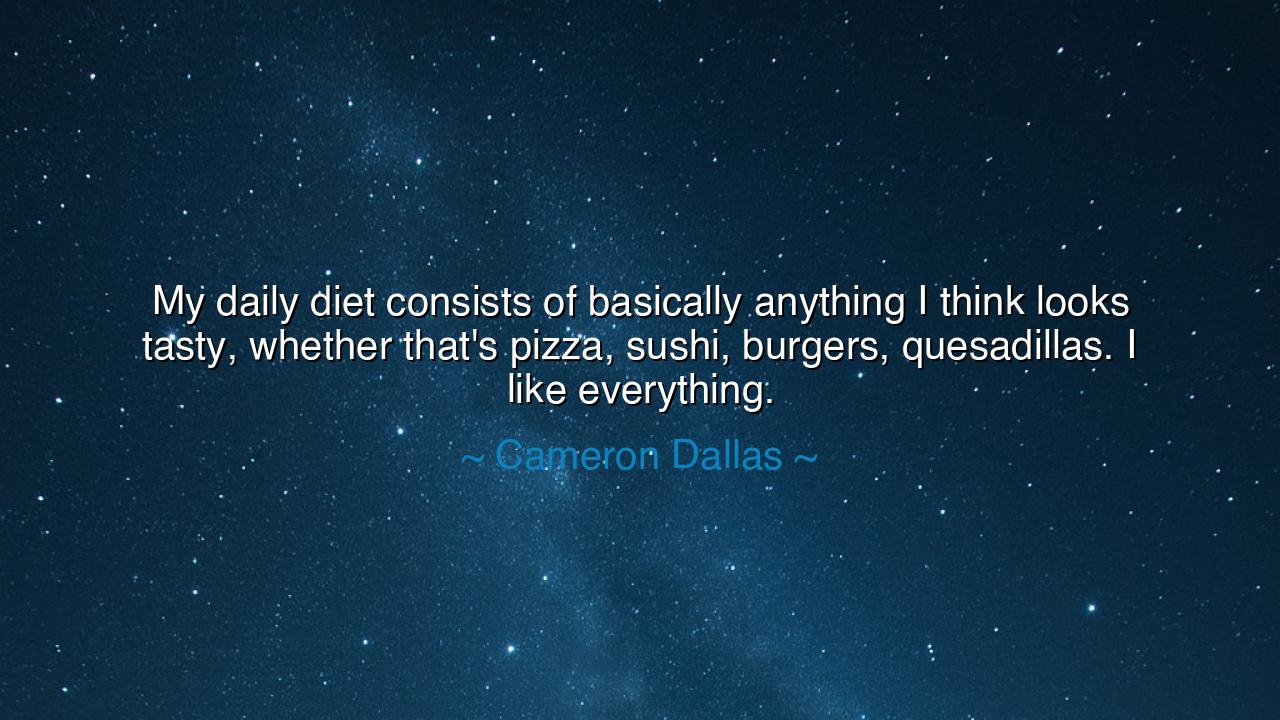
My daily diet consists of basically anything I think looks tasty
My daily diet consists of basically anything I think looks tasty, whether that's pizza, sushi, burgers, quesadillas. I like everything.






When Cameron Dallas said, “My daily diet consists of basically anything I think looks tasty, whether that's pizza, sushi, burgers, quesadillas. I like everything,” he was not merely speaking about food — he was revealing a philosophy of freedom, youth, and the unrestrained joy of living. His words carry the lightness of one who has not yet been chained by excess discipline, nor dulled by the fear of indulgence. It is a declaration of appetite for life itself — a reminder that the spirit, too, must be fed by delight, curiosity, and spontaneity. Yet, beneath this youthful ease lies a deeper lesson: that the ability to enjoy freely is sacred, but only when balanced with awareness.
The origin of these words rests in the life of a generation raised in abundance — a world where choices overflow, and where the act of choosing itself becomes a reflection of one’s nature. Cameron Dallas, a child of the digital age, embodies the spontaneity of the modern seeker — one who lives in the moment, guided by taste, texture, and experience. His diet of everything he finds “tasty” is both literal and symbolic. It speaks not only to food, but to an openness toward life, to the curiosity that dares to taste everything the world offers. Yet, as all ancients knew, the freedom to enjoy carries the hidden duty to discern. For pleasure, untempered by wisdom, can turn from sweetness to sickness in time.
The ancients often spoke of the balance between indulgence and discipline. The philosopher Epicurus, often misunderstood as a lover of excess, actually preached moderation. He said, “It is not the abundance of what we eat, but the simplicity of what we enjoy that brings peace.” Dallas’s sentiment — “I like everything” — echoes the first half of this truth: the embrace of joy, the love of variety. But the second half, the understanding of limit, must follow. In this way, his words remind us that youth is the time of sampling the world’s table, while maturity is the art of knowing when one has had enough.
Consider the story of Emperor Claudius, who in Rome’s golden age surrounded himself with feasts of endless diversity — dishes from distant lands, wines from every province. At first, his abundance symbolized power and prosperity. Yet, as years passed, the emperor grew frail and weary, for his indulgence dulled his vitality. What he loved began to enslave him. From his life we learn that to taste all things is good, but to be mastered by none is divine. This is the eternal truth behind Dallas’s lighthearted confession — that joy unbalanced by restraint leads to weariness, just as restraint unbalanced by joy leads to despair.
Still, there is beauty in his openness. In a world where many live by restriction and fear — of food, of judgment, of failure — his willingness to “like everything” reminds us to approach life with gratitude rather than guilt. To savor a meal, to delight in a slice of pizza or a piece of sushi, is to affirm the miracle of being alive. For food, in its essence, is not only fuel but celebration — a communion between the senses and the soul. The ancients broke bread before battle, shared wine before prayer, and cooked together as an act of unity. In each act of tasting, they found joy not in excess, but in connection.
In this spirit, Dallas’s carefree diet can be seen as an echo of the eternal youth within all of us — the part of the human soul that refuses to be entirely domesticated, that longs to explore, taste, and experience without fear. Yet the wise do not condemn such freedom; they refine it. They teach that it is not wrong to love everything, but one must learn to love with awareness. For in awareness lies health, in balance lies strength, and in gratitude lies peace.
So, my children of appetite and desire, remember this: it is not the food that corrupts the body, but the excess that numbs the spirit. Taste freely, but taste wisely. Enjoy what the world offers, but do not lose yourself in the feast. Let your diet — of food, of thoughts, of experiences — be guided not only by what is “tasty,” but by what nourishes your life and strengthens your purpose. For as Cameron Dallas reminds us through his innocent confession, the true art of living lies not in denial nor indulgence, but in learning to savor the world — with joy in the heart, gratitude in the soul, and wisdom in the mind.






AAdministratorAdministrator
Welcome, honored guests. Please leave a comment, we will respond soon